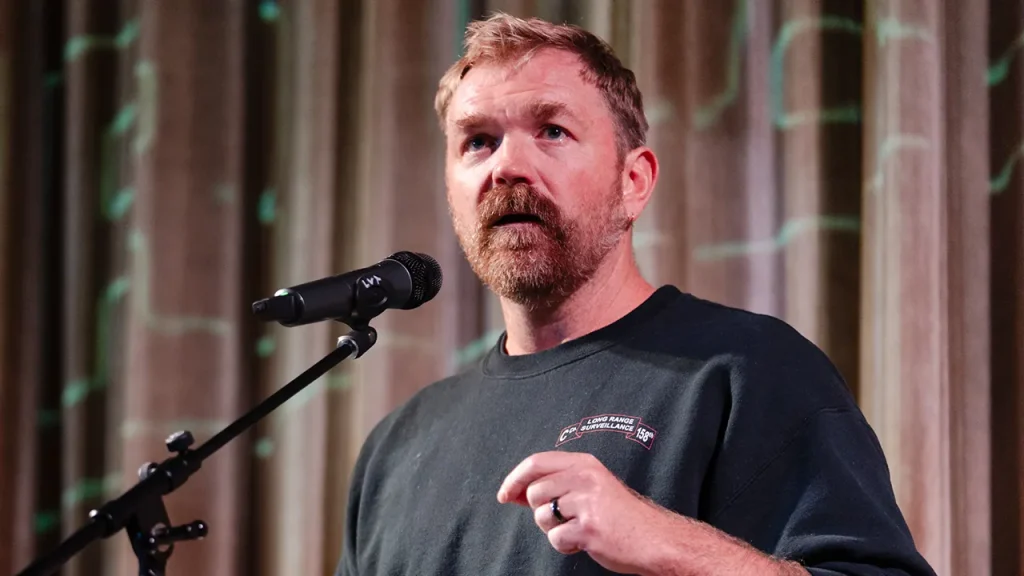Listen to the article
Maine Senate Candidate Draws Criticism for Refusing to Mourn Dick Cheney’s Death
Democratic U.S. Senate candidate Graham Platner has sparked controversy after declaring he would not mourn the death of former Vice President Dick Cheney, who died on November 3 at the age of 84.
“Usually when a former vice president passes we all take some time to mourn. As a veteran of the Iraq war I’m going to say, no, not this time,” Platner stated in a video posted to social media. He went on to criticize Cheney’s legacy, claiming the former vice president “wasted thousands of young American lives, hundreds of thousands of Iraqi lives, and trillions of dollars for absolutely nothing.”
Platner’s comments stand in stark contrast to the tributes that have poured in for Cheney from across the political spectrum. Former President George W. Bush, who served alongside Cheney for eight years, released a statement describing his former vice president as a “decent, honorable man” who “held to his convictions and prioritized the freedom and security of the American people.”
According to a statement from Cheney’s family, the former vice president died due to complications from pneumonia and cardiac and vascular disease. Cheney had a long history of heart problems, having survived five heart attacks and eventually receiving a heart transplant in 2012.
Platner’s controversial remarks come as he competes in a crowded field for Maine’s Senate seat. The left-wing candidate is running against Governor Janet Mills in the Democratic primary, while longtime Republican Senator Susan Collins has indicated she plans to seek re-election for what would be her sixth term in office.
This isn’t the first time Platner has found himself embroiled in controversy during his campaign. He previously faced criticism for writing that he “became a communist,” though he later claimed he was joking. In Maine’s politically moderate landscape, such positions could prove challenging for a Senate hopeful.
Cheney’s death has reignited debates about his controversial legacy, particularly regarding his role in advocating for the 2003 invasion of Iraq and subsequent foreign policy decisions during the Bush administration. As vice president, Cheney was a powerful figure who helped shape the administration’s response to the September 11 attacks and was a key architect of the global War on Terror.
Critics have long pointed to the Iraq War’s toll, which included thousands of American casualties and hundreds of thousands of Iraqi deaths, along with its massive financial cost. Supporters, meanwhile, have defended Cheney’s record, arguing that he made difficult decisions to protect American security during a dangerous period.
The timing of Platner’s remarks has drawn particular scrutiny, coming so soon after Cheney’s death when many political figures have temporarily set aside ideological differences to acknowledge his decades of public service. Before serving as vice president, Cheney had been a congressman from Wyoming, White House Chief of Staff under President Gerald Ford, and Secretary of Defense under President George H.W. Bush.
As Maine’s Senate race continues to develop, Platner’s comments may become a significant point of discussion in a state known for valuing political moderation and civility. Senator Collins, in particular, has maintained her seat partly by appealing to independent voters and demonstrating a willingness to work across party lines.
The 2026 Senate race in Maine is expected to be highly competitive, with national attention focused on the contest as Democrats and Republicans battle for control of the chamber.
Fact Checker
Verify the accuracy of this article using The Disinformation Commission analysis and real-time sources.




4 Comments
Cheney’s tenure as VP was certainly a polarizing one. While some praise his leadership, others see his decisions as disastrous. Platner’s blunt assessment reflects the strong feelings many still have about the Iraq War and its aftermath. It’s a complex issue without easy answers.
This is a contentious political issue, and I respect that reasonable people can disagree. While Platner’s comments may be controversial, I appreciate his willingness to take a stance and engage with voters on this difficult topic.
This is a sensitive topic, and I respect that different people will have different views on Cheney’s legacy. As a voter, I appreciate Platner being upfront about his stance, even if it is controversial. These are the kinds of honest discussions we need in politics.
As a veteran, I can understand Platner’s perspective. Cheney’s role in the Iraq War is a complex and divisive issue. While some may mourn him, others feel the human and financial costs were too high. It’s an understandable position, even if others disagree.